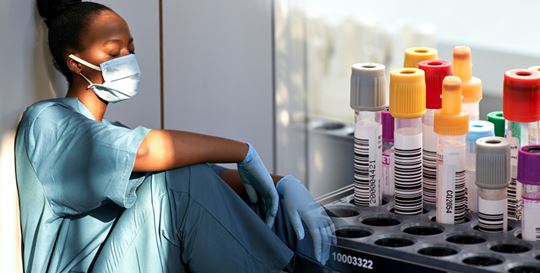Antigen testing provides an efficient, cost-effective way to mass test for COVID-19 which is essential for hospitals. Learn how one reference laboratory is using this test in their daily operation.
As the U.S. ushered in the new year, over 2 million daily COVID-19 tests were performed across the country in January, according to the COVID Tracking Project. While the number seems staggering, some public health experts estimate safely reopening schools and businesses could require performing over 6 million tests in the U.S. every day.ii

While the nationwide demand for testing is on its way up, so too is the shortage of supplies needed to perform COVID-19 tests themselves. This is especially true for the current gold standard for testing, the polymerase chain reaction (PCR) test which relies on a technique to amplify the virus’ genetic material.
PCR tests are almost 100% accurate and return very few false positives,iii however, they are expensive, require specialized set-ups and chemical reagents that are in short supply and typically take 1-2 days to return results.
Additionally, while people wait for their results, those who are infected but don’t yet know it, may continue to interact with others and spread the virus. As hospitals and laboratories all over the country assess their current protocols and ramp up for the tests to follow in the year to come, it’s clear that they will need to implement alternative diagnostic methods that are reliable, affordable and efficient.
Enter The COVID-19 Antigen Test
Antigen testing is a type of diagnostic test that relies on identifying protein segments (antigens) of the virus. There are several types of antigen tests: Point-of-care (POC), mass antigen tests and now a third category – at-home antigen tests like Ellume. Most POC antigen tests can be performed in the doctor’s office using a nasal or nasal pharyngeal swab and have the potential to deliver fast results.
Antigen testing can be a superior first line of defense when PCR testing is impacted because of greater availability and lower pricing. However, while POC antigen tests have a purpose in diagnosing COVID-19, they are difficult and resource-intensive in scale to address high-volume testing needs.
Jelica Wold, senior manager of immunoassay global product marketing at Beckman Coulter indicated there are other limitations to POC tests as well. "POC tests are a one-off test, and throughput for them is typically low – we have heard that between 5-20 POC tests can be performed by one individual per hour," Wold explained. “Compare that to up to 200 tests per hour on a DxI 800."
Also, the same test used to deliver a result within 15-30 minutes to a single individual can’t perform as efficiently when it’s asked to deliver results for 100 or 1,000 individuals. The solution to this problem is scaling up volume using mass antigen testing.
Automated Solutions Enhance Workflow

To address the demand that laboratories all over the country are facing, mass antigen tests work around the challenges associated with scaling high-volume antigen testing. The testing utilizes a higher level of automation, resulting in reduced risk of analytical errors and improved workflow.
Wold explained that having high-volume testing available in the laboratory -- where experience managing the workflow for infectious samples exists -- facilitates the understanding of prevalence and infectious status and allows for containment and management.
Results of mass antigen tests are automatically sent to the laboratory information system, unlike POC tests that are often manually recorded into the EMR. Automated antigen tests have the potential to deliver 50-200 tests per hour depending on the type of analyzer used by the laboratory.
Mass antigen tests can be performed on the same patient population as PCR tests: individuals who are suspected of COVID-19 by their healthcare provider for various reasons, including known infection exposures or working in high-risk environments, as well as asymptomatic patients.

 English
English





